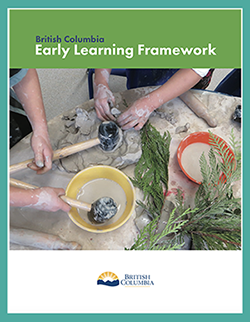Module 1: The Principles of Early Learning
Educators and Early Learning
Educators are researchers and collaborators.
Educators work with children and their families as partners in research. This means, as an educator
- You always observe, listen, and experiment. You are open to the unexpected
- Your role is shifting (or has shifted). You are changing (or have changed) from giving knowledge to giving children a chance to invent, investigate, build theories, and learn
- You strive to work with children and listen to them. You try to make them feel safe, confident, and motivated
- You foster curiosity. This helps you to expand children’s learning as well as your own
- You examine your practice
- You examine your expectations
- You examine your biases to see if (and how) they may contribute to racism or prejudices
- You do not see yourself as having the “right” knowledge of learning theory and practice. You are a learner as well as an educator
- You are continually modelling continuous learning
Case Study: Reflecting on your practice
A pediatric Speech-Language Pathologist (SLP) in a child development centre was working with a child and their grandmother. The grandmother seemed very uncomfortable in the small therapy room with the one-way window. The SLP, reflecting on her practice, gently asked the grandmother if she was uncomfortable. The grandmother replied that she was a residential school survivor and the small room was very uncomfortable for her. The SLP understood, and they moved to a larger, sunny room with two large windows. The grandmother appeared to relax, and the session continued successfully. Now, the SLP discusses comfort levels with therapy rooms, treatment materials, and clinicians with families before the therapy sessions start.
Reflective Questions
The SLP's ability to pay attention to the family member helped her reflect on her practice and make appropriate changes.
When you reflect on your practice, could you find ways to enhance it for children and their families? How could you reflect on cultural awareness?
Case Study: Fostering curiosity and creativity
Children and educators at a nature education program are having their snacks outside, sitting on a tarp. A few of the children start to notice and marvel at the leaves that are being blown around, finally coming to rest in the middle of the tarp. One of the children exclaims, “I see yellow, blue, and red leaves falling down!” One of the educators notices the children’s excitement and interest and asks them, “What colours do you see?” Another child exclaims, “I see red! I see brown, yellow, green, and brown and yellow again.” The children continue to watch the leaves and comment on the colours. The educator prompts them with questions about why the leaves are different colours.
The children’s ideas, theories and observations, provoked by the educator’s questions, are full of wonder and intrigue. The educators create a child-led learning experience around color theory, plant biology, seasons, and natural elements. The children’s understandings will form the basis on which new experiences will occur, as they continue to play and learn in nature.
Reflective Question
In your own practice, how could you foster curiosity and creativity to extend children’s learning?
